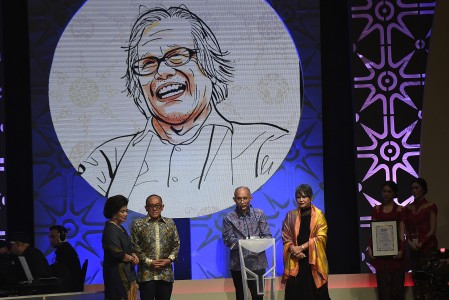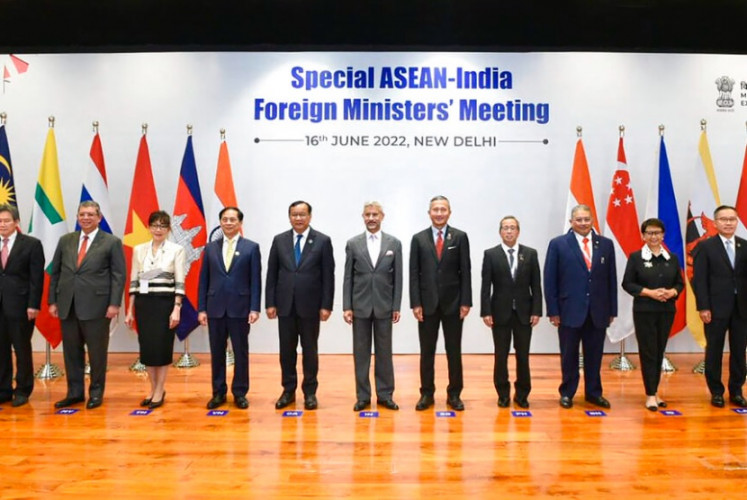The Jakob way
He laid the foundation for “safe journalism”, which allowed Kompas to survive and thrive during the Soeharto dictatorship and remain effective in voicing the people’s aspirations. In the coming years, Kompas will likely continue to do so.
 The son of Kompas Gramedia founder Jakob Oetama, Irwan Oetama (second right) speaks on behalf of his father when receiving teh Achmad Bakrie Award on Wednesday, Aug. 14, 2019. The award recognizes Jakob's accomplishment in journalism. (Antara/Aditya Pradana Putra)
The son of Kompas Gramedia founder Jakob Oetama, Irwan Oetama (second right) speaks on behalf of his father when receiving teh Achmad Bakrie Award on Wednesday, Aug. 14, 2019. The award recognizes Jakob's accomplishment in journalism. (Antara/Aditya Pradana Putra)
S
ome of us may not know Jakob Oetama, who died at the age of 88 on Wednesday. But we know his legacy, which is Kompas, the leading national daily, and his business conglomerate Kompas Gramedia Group. It was his journalistic style that was the key to his success in turning Kompas into the huge media-based empire it is today. He laid the foundation for “safe journalism”, which allowed Kompas to survive and thrive during the Soeharto dictatorship and remain effective in voicing the people’s aspirations. In the coming years, Kompas will likely continue to do so.
Many of us, particularly those with liberal minds, would have been impatient with this style, but under Jacob, it worked and that’s what mattered. Kompas could have been more hard-hitting, but it would not have survived and grown this big.
While championing good journalism, with its obvious option for the weak, poor and marginalized, Kompas developed the art of criticizing without attacking, rooted in the Javanese culture, which Jakob and many of his protégés rose from.
This subtle, sophisticated way of criticizing was an effective mechanism to deal with a regime that had no hesitation to stifle the press. But even such an approach could not save Kompas from a press ban. In 1978, the daily, along with many other media outlets, was banned for criticizing then-president Soeharto who was bidding for a new term.
Jakob’s defense of press freedom, however, was unquestionable. In his testimony in court, he denied a claim by theninformation minister Harmoko that the government had consulted the Press Council before banning Tempo, Editor and Detik in 1994 for their coverage of the purchase of warships from former East Germany, which offended Soeharto.
In fact, journalism for Jakob was not just about having the guts to be critical of the powers that be. As one of his journalists recalls, journalism is a matter of putting issues into context to enable people to know what the problem really is.
Started by a Catholic foundation, Kompas under Jakob and his friend PK Ojong was smart in not turning it into a Catholic newspaper. In specific, Jabob intentionally opened a big space for Islamic voices as an attempt to help moderate Islam to develop and grow in Indonesia. Indeed, he once shocked many when he appointed a Muslim to succeed him as Kompas chief editor.
Kompas serves a wider audience across the political, ethnic and religious divides, which in Jakob’s view are bound by humanity. As we see today, pluralism, humanity and compassion are among the messages Kompas and its affiliated media — TV, radio and news portal — wish to share with the public. In this sense, this nation is indebted to Jakob.








